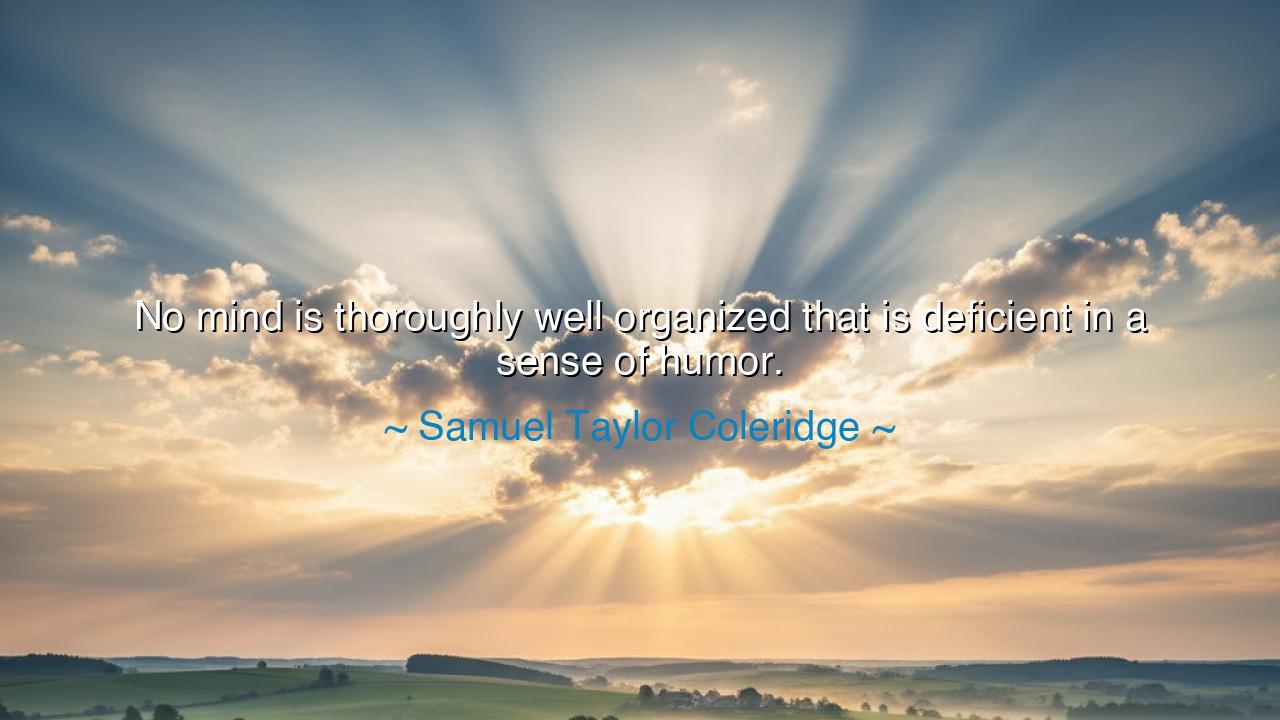
No mind is thoroughly well organized that is deficient in a sense






In the luminous words of Samuel Taylor Coleridge, poet and philosopher of the Romantic age, there shines a truth that transcends time and intellect: “No mind is thoroughly well organized that is deficient in a sense of humor.” Within this simple observation lies a profound understanding of the human spirit—that wisdom and laughter are not enemies, but twin flames that together illuminate the path of reason. A mind that cannot laugh, Coleridge reminds us, is like a machine without music: efficient, perhaps, but joyless, rigid, and incomplete.
To grasp the depth of this saying, we must understand Coleridge himself—a man of immense intellect and turbulent heart. He was a thinker of philosophy, a poet of imagination, and a lover of paradox. He lived at a time when science, reason, and art began to battle for supremacy, yet he saw beyond their divisions. To him, the well-organized mind was not one that knew everything, but one that could balance everything: logic and intuition, gravity and mirth, thought and laughter. For humor, in his eyes, was not frivolity—it was the mark of balance, the gentle reminder that life’s contradictions are not curses, but mysteries to be embraced.
The sense of humor, then, is the soul’s compass against arrogance and despair. It humbles the wise and uplifts the weary. The ancients knew this truth long before Coleridge gave it words. The Greek philosopher Socrates, though famed for his reason, was also known for his wry laughter. He used irony as a sword of enlightenment, cutting through ignorance not with anger, but with wit. His humor was not mockery—it was mercy, an acknowledgment that the folly of mankind is as natural as its brilliance. In this way, Socrates too lived Coleridge’s wisdom: that the mind without laughter becomes heavy, unable to bend without breaking.
Consider the story of Abraham Lincoln, who in the darkest days of the American Civil War, carried a heart full of sorrow yet a spirit quick with humor. His laughter was not denial; it was survival. When asked why he often told jokes in moments of crisis, he replied, “If I did not laugh, I should die.” His humor did not lessen his wisdom—it deepened it. It allowed him to remain human amid horror, to think clearly when others despaired. Lincoln’s humor was not a mask—it was medicine. It was the expression of a mind well-organized, one that could feel pain without being consumed by it.
Humor, in its truest form, is the mark of inner freedom. It is the power to see beyond fear and vanity—to glimpse the absurdity of existence and still find it beautiful. A deficient mind, lacking humor, clings too tightly to its own seriousness. It cannot see itself from afar; it mistakes importance for wisdom, solemnity for strength. Such a mind becomes brittle, unable to bend with the winds of change. But the mind that laughs, as Coleridge teaches, is supple, alive, self-aware. It finds harmony not by denying life’s chaos, but by dancing with it.
Even the divine is not devoid of laughter. In many sacred traditions, from the mystics of Sufism to the monks of Zen, humor is a doorway to enlightenment. The Zen master, when asked a question too serious for words, will often answer with a smile or a riddle. For laughter breaks the barrier between thought and being; it silences pride and opens the heart to truth. Thus, Coleridge’s insight becomes eternal: that humor is not the opposite of wisdom—it is its completion.
So let this be the lesson passed down through generations: cultivate your reason, but never lose your laughter. Let humor be your companion in study, your shield in hardship, your mirror in pride. When life grows heavy with its demands, let laughter lift you into perspective. Do not mistake solemnity for wisdom; the universe itself is filled with paradox and play. To laugh kindly, deeply, and wisely is to stand in harmony with creation.
For in the end, Samuel Taylor Coleridge’s words remind us that the greatest minds are not those who conquer the world with logic, but those who understand it with compassion—and laughter. A well-ordered mind is not a fortress of thought, but a living garden where intellect and joy grow side by side. To live with humor is to live with balance, and to live with balance is to live wisely.






AAdministratorAdministrator
Welcome, honored guests. Please leave a comment, we will respond soon